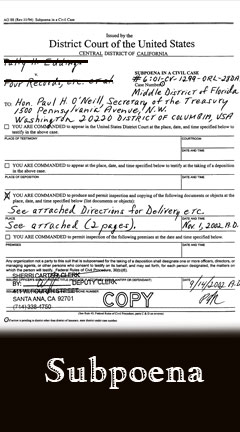Archival Notice
This is an archive page that is no longer being updated. It may contain outdated information and links may no longer function as originally intended.
Home | Glossary | Resources | Help | Course Map
A subpoena is a court order for the named person to appear as a witness in that court on a specific matter and at a specific time.
The purpose of a subpoena to appear is to secure the appearance of a witness to testify on a specific date in advance. The appearance may be for a deposition, pretrial hearing, trial, or a posttrial or grand jury proceeding.
The court or authorized parties may issue subpoenas. A properly served subpoena is accomplished in person through personal service to the witness or an authorized person. Being "served" is simply part of the testifying process to secure the appearance of an important and necessary witness for legal proceedings.
The definition of what is considered "personal service" is determined by jurisdictional rules of procedure. Some jurisdictions allow someone other than the named witness to accept service of the subpoena.
A properly served subpoena compels the recipient witness to appear at a specific time and place and therefore is a compulsory process. Subpoenas served in person are legally binding. Subpoenas sent by mail or accepted by someone other than the named witness may not be binding in some jurisdictions.
Sometimes, it is beneficial to the expert to be under subpoena rather than to voluntarily appear for trial. The expert's independence and credibility are enhanced if the expert has been subpoenaed.
Additional Online Courses
- What Every First Responding Officer Should Know About DNA Evidence
- Collecting DNA Evidence at Property Crime Scenes
- DNA – A Prosecutor’s Practice Notebook
- Crime Scene and DNA Basics
- Laboratory Safety Programs
- DNA Amplification
- Population Genetics and Statistics
- Non-STR DNA Markers: SNPs, Y-STRs, LCN and mtDNA
- Firearms Examiner Training
- Forensic DNA Education for Law Enforcement Decisionmakers
- What Every Investigator and Evidence Technician Should Know About DNA Evidence
- Principles of Forensic DNA for Officers of the Court
- Law 101: Legal Guide for the Forensic Expert
- Laboratory Orientation and Testing of Body Fluids and Tissues
- DNA Extraction and Quantitation
- STR Data Analysis and Interpretation
- Communication Skills, Report Writing, and Courtroom Testimony
- Español for Law Enforcement
- Amplified DNA Product Separation for Forensic Analysts


